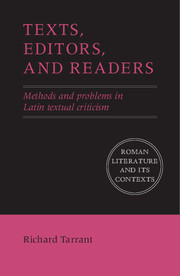Book contents
- Frontmatter
- Dedication
- Contents
- Preface
- Introduction
- 1 Textual criticism in a post-heroic age
- 2 The rhetoric of textual criticism/textual criticism as rhetoric
- 3 Establishing the text 1: recension
- 4 Establishing the text 2: conjecture
- 5 Establishing the text 3: interpolation, collaboration, and intertextuality
- 6 Textual criticism and literary criticism: the case of Propertius
- 7 Presenting the text: the critical edition and its discontents
- 8 The future: problems and prospects
- Appendix Reading a critical apparatus
- Bibliography
- General index
- Index of passages discussed
- Index of scholars
Introduction
Published online by Cambridge University Press: 05 March 2016
- Frontmatter
- Dedication
- Contents
- Preface
- Introduction
- 1 Textual criticism in a post-heroic age
- 2 The rhetoric of textual criticism/textual criticism as rhetoric
- 3 Establishing the text 1: recension
- 4 Establishing the text 2: conjecture
- 5 Establishing the text 3: interpolation, collaboration, and intertextuality
- 6 Textual criticism and literary criticism: the case of Propertius
- 7 Presenting the text: the critical edition and its discontents
- 8 The future: problems and prospects
- Appendix Reading a critical apparatus
- Bibliography
- General index
- Index of passages discussed
- Index of scholars
Summary
I
When I pick up a new novel or work of non-fiction, I do not expect to see an editor credited; I assume that I am in direct contact with a text created by an author and put into circulation by a publisher. In fact, matters may be more complicated if, for example, the publisher has employed a copy-editor to correct the author's manuscript, a practice once common but now increasingly rare outside academic publishing. Yet such behind-the-scenes activity is hardly ever acknowledged, which maintains the impression of an unmediated communication between author and reader.
So the presence of an editor implies that something has occurred that requires assistance from a third party in putting an author's work into the hands of readers. In the case of a contemporary work, the author may have died before the text had reached a final form, and the editor's task is to construct as far as possible the text that the author would have wished to see published. Such undertakings can involve extensive intervention, as with David Foster Wallace's novel The Pale King, left unfinished at his death in 2008 and published in 2011. The editor, Michael Pietsch, began with a manuscript of more than 1,000 pages and arrived at a version of roughly half that length.
An ancient parallel is Virgil's Aeneid, left unrevised at the poet's death and prepared for publication by his friend and fellow-poet L. Varius Rufus. The biographical tradition reports that the emperor Augustus, in overruling Virgil's wish that the manuscript of the poem be burned, directed Varius to make as little change to the text as was necessary to render it publishable; even if that account is accurate, we have no way of knowing how much of what we read as Virgil is in fact the work of Varius.
The other main function of an editor in the contemporary context is to bring together work that has been dispersed in separate publications or that has not been previously published. A recent example is Archie Burnett's edition of the poetry of Philip Larkin (2012), which has been criticized for including poems that Larkin never published and that he may not have wished to see in print.
- Type
- Chapter
- Information
- Texts, Editors, and ReadersMethods and Problems in Latin Textual Criticism, pp. 1 - 17Publisher: Cambridge University PressPrint publication year: 2016

